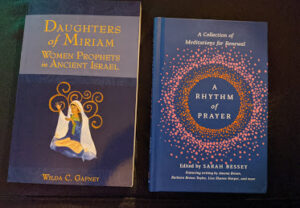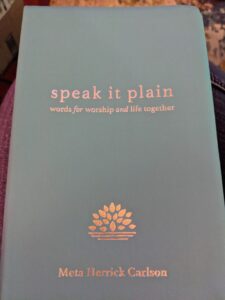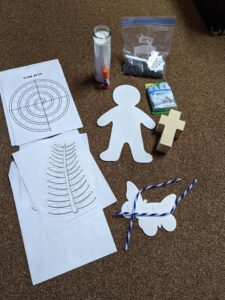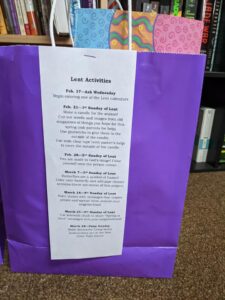Revised Common Lectionary: Numbers 21:4-9; Psalm 107:1-3, 17-22; Ephesians 2:1-10; John 3:14-21
Narrative Lectionary: Rich Man and Lazarus, Luke 16:19-31 (Psalm 41:1-3)
The people began to complain against Moses and God in Numbers 21:4-9 for leading them into the wilderness. Even if they were no longer enslaved in Egypt, they were complaining about the lack of food and water, and the food God provided—manna—they hated. God sent poisonous serpents to bite the people, and many became sick and died. The people came to Moses, recognizing they have sinned, and asked Moses to pray to take away the serpents. God told Moses to craft a poisonous serpent from bronze to set upon a pole, so that everyone who was bitten would look at it and live. For a people who were bitter and complaining, their words were like poisonous serpents, poisoning the people who can only see what is right in front of them. Once they were reminded to lift up their eyes and remember that God had brought them out of their oppression, they were able to survive and live.
Psalm 107:1-3, 17-22 praises God and gives thanks for God’s faithfulness. In verses 17-22, the psalmist specifically recalls the time when the people were in the wilderness, complaining about the food they had to eat, and they were “sick in sin.” Because they remembered God and cried out to God, they were saved. God healed them and delivered them from their destructive ways. The psalmist calls upon the people to give thanks to God, to offer thanksgiving sacrifices, and proclaim what God has done through songs of joy.
Ephesians 2:1-10 (a personal favorite passage of mine) speaks to how we live in the world versus God’s intentions for us. We have followed the course of this world which leads to sin and death—worldly measures of success, wealth, notoriety—all those lead to dead ends. None of it will last and all of it leads to supporting systemic sin—oppression, enslavement, cruel workplace practices, racism, marginalization, etc. By grace, however, Christ came for us. By grace we have been saved and shown the immeasurable riches of God. Because of Christ, none of us can boast about what we have or haven’t done. Rather, Christ restores us to God’s intentions, which is for goodness and good works. This was God’s intention from Genesis 1. We have been restored, and God has prepared this to be our way of life.
John 3:14-21 is the second part of Jesus’ conversation with Nicodemus, a Pharisee who has come to see Jesus by night. Verse 14 begins with using the story of Moses and the serpents in Numbers 21:4-9. The people were saved when they looked to the serpent on the pole, when they looked beyond what they could see in front of them—the poisonous grumblings that had infiltrated the camp—and instead looked to God and God’s ways. So the Son of Man must be lifted up, according to John’s account, on a cross. As the people in Moses’ day were saved from poison when they looked up, those who believe will be saved when they believe in Jesus and will have eternal life. While vs. 16 is one many know by heart, it is just as important to know vs. 17, that God did not send the Son to condemn the world, but to save the world. The condemnation comes for those who love the ways of the world more than the ways of God, but those who know the truth know the goodness of God’s created intention for us, and their works reflect that intention.
The Narrative Lectionary focuses on the story Jesus tells of the Rich Man and Lazarus in Luke 16:19-31. Some call this story a parable, but it is unique in that one of the characters, Lazarus, is named. Lazarus is the poor man who lies at the gate with no power or agency, and the rich man with all the power and agency at the beginning of the story remains unnamed. Lazarus longed to have the scraps from the table of the rich man, but instead, the rich man’s dogs came and licked his sores. When the two men died, Lazarus was carried by the angels to be with Abraham, but the rich man was in Hades, tormented, longing for Lazarus to come bring him some water. Even in Hades, the rich man acted like a rich man. The rich man asked Abraham to send Lazarus to his brothers to warn them, but Abraham said if they didn’t listen to Moses or the prophets, they won’t listen to someone even if they rise from the dead.
Psalm 41:1-3 is a blessing for those who remember to care for the poor and their needs, for God certainly has not forgotten them. God is with the poor when they are disadvantaged and helps heal those who are sick. God gives strength to those who are oppressed and marginalized.
God’s intention for us is the same intention for all of creation in Genesis 1: for goodness. However, we have fallen from that intention, seeking the ways of the world. The ways of the world teach us to desire what others have, and to not be satisfied. The ways of the world teach us that sin is only individual and personal, instead of also being collective, as the Hebrew scriptures show us again and again. The ways of this world allow us to ignore the plight of others, those who labor in unsafe work conditions, those who are practically enslaved, as long as we live in comfort. The ways of the world teach us to ignore how our actions affect others. Christ came and taught us to become last of all and servant of all, to seek the best for others. When we mutually care for each other’s needs, we find our own needs are met. This is what God intended us for: good works, which God prepared beforehand to be our way of life (Ephesians 2:10).
Call to Worship (from Psalm 107:1, 21-22)
O give thanks to the LORD, for God is good;
God’s steadfast love endures forever.
Let us be thankful for God’s steadfast love,
for God’s wonderful works to humankind.
And let us offer thanksgiving sacrifices,
and tell of God’s deeds with songs of joy.
Come, let us worship our God, gathered from near and far,
For God’s steadfast love endures forever.
Prayer of Brokenness/Confession
God Who So Loves the World, You sent us Your only Son, so that we might believe and have eternal life. We have often failed to understand that eternity begins now, that the life You offer is here, and transcends death. We have often failed to understand that how we live matters, and that we sometimes participate in the sins of this world without recognizing it. We have often sinned in our purchases, in our desires, in our shrugging shoulders, in our longing to just focus on ourselves. Forgive us and call us from our sinful, selfish ways. Call us back to You, God Who So Loves the World, so that we might remember You came not to condemn but to save. Help us to turn our hearts, and be restored to You. In the name of Christ, who redeems us all, we pray. Amen.
Blessing/Assurance
Because God So Loved the World, God loves you very, very much. God desires for us to work on letting go of our sinful ways and turning to God’s ways: loving our neighbor as ourselves, serving others, and caring for others. For when we mutually care, respect, and love one another, our own needs are met, and we know God’s love through the love of others. Take courage! God is with you, God loves you, and God has forgiven you. Go share the Good News.
Prayer
Holy, Holy, Holy, Lord God Almighty, we lift our prayers to You, knowing that the world is not as it should be. There is violence. There is poverty, disease, and despair. But we turn to You and Your ways, knowing that when we remember who You created us to be, we find the true life and treasures of heaven. When we lift You up, we remember there is no other idol, no other god for us. There is no other way for us to live, for all other ways are false and lead to dead ends. Holy, Holy, Holy One—remind us of what is holy, and good, and true. In the name of Christ, who leads us into life, we pray. Amen.




